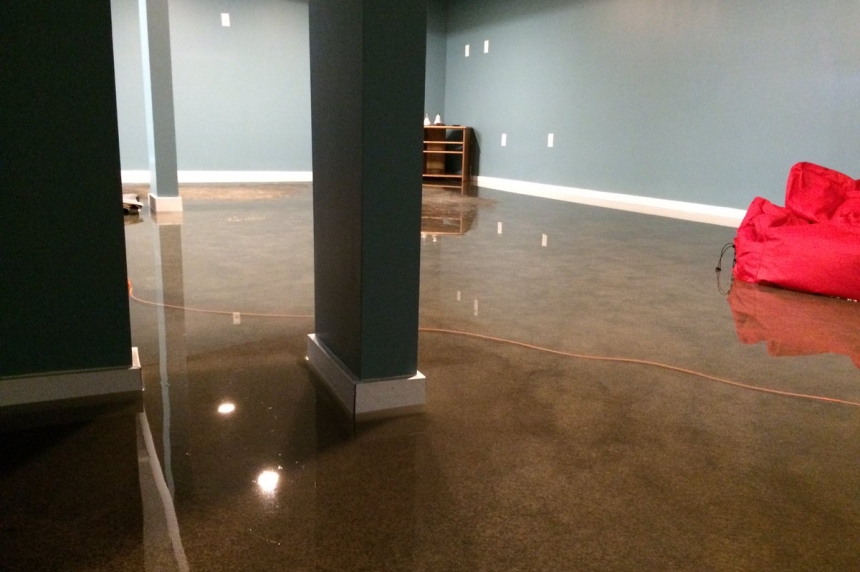A water-damaged basement may confront homeowners and commercial property owners or managers with unforeseen challenges. In this case, the best approach to water damage in the basement what to do is call in trained professionals. Commercial- or industrial-grade pumps and cleaning equipment and professional training are necessary to extract water from a subterranean level of a structure as quickly as possible while preventing structural damage.
Here are four general steps that basement experts take to mitigate and restore water damage at the lowest level of a structure.
1. Inspect Basement Water Damage
Property owners may observe obvious signs of damage to building materials and contents caused by the accumulation of water in a basement. Specialists will account for many other factors that may not be immediately evident, such as pressure levels on the interior and exterior basement walls.
An inspection should take place as soon as possible after the damage occurs. It may be possible to limit the severity of basement water damage if a property owner becomes aware of the situation as soon as it starts and arranges for inspection in a matter of hours. Ideally, mitigation and cleanup should start within 24 hours.
2. Extract Standing Water
Rather than renting pumps and cleaning tools that may not be the most effective equipment for eliminating standing water from a basement, a homeowner or commercial property owner should rely on a basement cleanup service. Professionals have access to equipment that reliably pumps water out of the lowest level of structures and the training necessary to do so without causing additional damage.
Other specialized tools can be used to monitor pressure levels and prevent structural damage that could otherwise occur if the water is pumped out too quickly. Mitigation measures may be helpful for preventing basement building materials and contents from sustaining additional damage during any delays that are necessary to preserve structural integrity.
3. Cleaning and Disinfection
If clean and treated water from a supply line floods a basement, it may be possible to extract any standing water and promote drying without additional cleaning or the need to apply disinfectant. Property owners should be aware of the fact that even if the water is not contaminated when damage occurs, its condition will degrade over time.
Clean water that is exposed to building materials, chemicals, and debris over a prolonged period can downgrade an instance of Category One water damage into Category Two or Category Three water damage in as little as 72 hours.
Sewer lines or main backups are also frequent causes of basement flooding. Water from these sources is likely to contain solid waste. At least one round of disinfection will be necessary to restore a basement to a safe and usable condition. Depending on the severity of the damage, a pre-treatment may be applied prior to cleaning and removal of any ruined building materials or contents.
Relying on trained experts for water damage in the basement what to do may help to avoid reintroducing dangerous contaminants or pathogens during the process of tearing out ruined materials. Specialists also have a clearer sense of what to remove, replace, or attempt to clean.
4. Promote Fast Drying
Drying out a basement can pose a challenge. The portion of structures situated underground tends toward dampness, which can quickly lead to a mold problem after basement water damage. Basement water damage specialists may recommend the use of additional ventilation or running a dehumidifier to draw moisture out of porous surfaces and deter mold formation.
Basement restoration professionals follow these four steps when dealing with any category of water damage. It may take less time to extract and dry Category One water damage from a broken pipe than Category Two or Category Three water damage involving contaminated water.
The difference professional expertise and equipment can make is clear when it comes to completing the process of extraction, cleaning, disinfection, and drying as thoroughly and quickly as possible. Trained experts are also aware of potential problems that could arise due to unequal pressure levels or untreated contamination.
Property owners seeking the best basement water damage specialists should call United Water Restoration Group. Homeowners and commercial property owners and managers unsure about water damage in the basement what to do can benefit from a network of trusted companies that provide mitigation, cleanup, and restoration services.
We provide services in Ormond Beach, Florida, Jacksonville, Florida, Daytona Beach, Florida, Orlando, Florida, Tampa, Florida, Melbourne, Florida, and many other locations around Florida!





